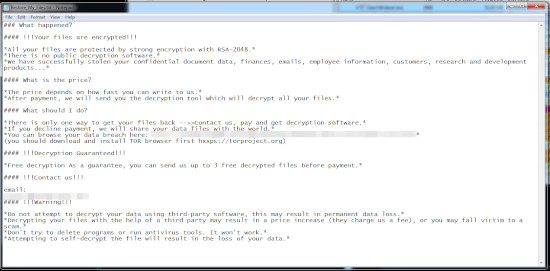Ransom.Win64.PANDORA.YECCM
VHO:Trojan-Ransom.Win64.Pandora.a(KASPERSKY), Win64:RansomX-gen [Ransom](AVAST)
Windows


Threat Type: Ransomware
Destructiveness: No
Encrypted:
In the wild: Yes
OVERVIEW
Downloaded from the Internet, Dropped by other malware
This Ransomware arrives on a system as a file dropped by other malware or as a file downloaded unknowingly by users when visiting malicious sites.
It drops files as ransom note. It avoids encrypting files with the following file extensions.
TECHNICAL DETAILS
223,232 bytes
EXE
No
Displays message/message boxes
Arrival Details
This Ransomware arrives on a system as a file dropped by other malware or as a file downloaded unknowingly by users when visiting malicious sites.
Installation
This Ransomware adds the following processes:
- %System%\cmd.exe vssadmin.exe delete shadows /all /quiet
(Note: %System% is the Windows system folder, where it usually is C:\Windows\System32 on all Windows operating system versions.)
It adds the following mutexes to ensure that only one of its copies runs at any one time:
- ThisIsMutexa
Other Details
This Ransomware does the following:
- It empties the Recycle Bin.
- It uses Windows Restart Manager to unlock files it will encrypt.
- It bypasses Antimalware Scan Interface (AMSI)
Ransomware Routine
This Ransomware avoids encrypting files with the following strings in their file name:
- autorun.inf
- boot.ini
- bootfont.bin
- bootsect.bak
- bootmgr
- bootmgr.efi
- bootmgfw.efi
- desktop.ini
- iconcache.db
- ntldr
- ntuser.dat
- ntuser.dat.log
- ntuser.ini
- thumbs.db
- Program Files
- Program Files (x86)
- #recycle
It avoids encrypting files with the following strings in their file path:
- AppData
- Boot
- Windows
- Windows.old
- Tor Browser
- Internet Explorer
- Opera
- Opera Software
- Mozilla
- Mozilla Firefox
- $Recycle.Bin
- ProgramData
- All Users
It appends the following extension to the file name of the encrypted files:
- .pandora
It drops the following file(s) as ransom note:
- {Encrypted Directory}\Restore_My_Files.txt

It avoids encrypting files with the following file extensions:
- .hta
- .exe
- .dll
- .cpl
- .ini
- .cab
- .cur
- .drv
- .hlp
- .icl
- .icns
- .ico
- .idx
- .sys
- .spl
- .ocx
SOLUTION
9.800
17.438.07
13 Mar 2022
17.439.00
14 Mar 2022
Step 1
Trend Micro Predictive Machine Learning detects and blocks malware at the first sign of its existence, before it executes on your system. When enabled, your Trend Micro product detects this malware under the following machine learning name:
- PUA.Win32.TRX.XXPE50FFF055
Step 2
Before doing any scans, Windows 7, Windows 8, Windows 8.1, and Windows 10 users must disable System Restore to allow full scanning of their computers.
Step 3
Note that not all files, folders, and registry keys and entries are installed on your computer during this malware's/spyware's/grayware's execution. This may be due to incomplete installation or other operating system conditions. If you do not find the same files/folders/registry information, please proceed to the next step.
Step 4
Search and delete these files
- {Encrypted Directory}\Restore_My_Files.txt
Step 5
Scan your computer with your Trend Micro product to delete files detected as Ransom.Win64.PANDORA.YECCM. If the detected files have already been cleaned, deleted, or quarantined by your Trend Micro product, no further step is required. You may opt to simply delete the quarantined files. Please check the following Trend Micro Support pages for more information:
Step 6
Restore encrypted files from backup.
Did this description help? Tell us how we did.

